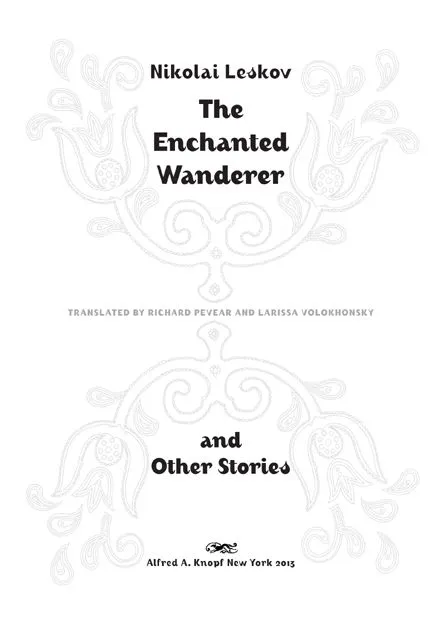The Enchanted Wanderer: and Other Stories (Vintage Classics)
The Enchanted Wanderer
and Other Stories

This Is a Borzoi Book
Published by Alfred A. Knopf
Translation copyright © 2013 by Richard Pevear and Larissa Volokhonsky
Introduction copyright © 2013 by Richard Pevear
All rights reserved. Published in the United States by Alfred A. Knopf, a division
of Random House, Inc., New York, and in Canada by Random House of Canada
Limited, Toronto. Originally published in Great Britain, in somewhat different
form, by Impress Books Ltd., Devon, in 2012.
www.aaknopf.com
Knopf, Borzoi Books, and the colophon are registered trademarks of Random House, Inc.
Portions of this work were originally published in the following: “The Pearl
Necklace” and “A Flaming Patriot” in The Hudson Review (Summer 2011); “The
Lady Macbeth of Mtsensk” in The Hudson Review (Winter 2012); and “The
Spirit of Madame de Genlis” in The Threepenny Review (Winter 2013).
Library of Congress Cataloging-in-Publication Data
Leskov, N. S. (Nikolai Semenovich), 1831–1895.
[Works. English. Selections. 2013]
The enchanted wanderer and other stories / by Nikolai Leskov; translated by
Richard Pevear and Larissa Volokhonsky.
pages ; cm
Includes bibliographical references.
eISBN: 978-0-307-96236-2
I. Pevear, Richard, [date], translator. II. Volokhonsky, Larissa, translator. III. Title.
PG3337.L5A255 2013
891.73′3—dc23
2012025416
This is a work of fiction. Names, characters, places, and incidents either are the
product of the author’s imagination or are used fictitiously. Any resemblance to
actual persons, living or dead, events, or locales is entirely coincidental.
Jacket design by Peter Mendelsund
v3.1_r1
Contents
Cover
Title Page
Copyright
Introduction
Translators’ Note
The Lady Macbeth of Mtsensk
The Sealed Angel
The Enchanted Wanderer
Singlemind
The Devil-Chase
Deathless Golovan
The White Eagle
A Flaming Patriot
Lefty
The Spirit of Madame de Genlis
The Toupee Artist
The Voice of Nature
A Little Mistake
The Pearl Necklace
The Spook
The Man on Watch
A Robbery
Notes
A Note About the Author
Other Books by This Author
Introduction
Leskov is a writer who yields enormous pleasure, breaking past sectarian literary and ideological premises. But more: we live in a moment of lowered cultural and emotional expectations, after the fall of modernism but with nothing very strong to replace it. To go back to certain earlier writers is to regain a sense of human possibility. To go back to Leskov is to regain a sense of the passion, sometimes the joy, that can be part of the human enterprise.
IRVING HOWE, “JUSTICE FOR LESKOV”
I
Nikolai Leskov, a younger contemporary of Dostoevsky and Tolstoy and one of the great masters of Russian fiction, is a writer who keeps being discovered. The first to discover him was Leskov himself. He was in his late twenties and working as a business agent for his uncle, a Russianized Scotsman named Alexander Scott, whose firm managed the vast estates of two noble Russian families. Leskov later described those years, from 1857 to 1859, as the best period of his life. He traveled all over Russia, “from the Black Sea to the White and from Brod to Krasny Yar,” and sent back reports in the form of letters to his uncle. “I had no need to clear myself a path to the people through books and ready-made ideas,” he later wrote. “I studied them in place. Books were a precious help to me, but I was the helmsman. Hence I’m not rooted in any school, because it was not in school that I learned, but on Scott’s barges.” These travels gave him a great store of impressions that he drew upon all his life. Scott was struck by the literary quality of Leskov’s reports and used to read them aloud to his neighbors, one of whom praised them so highly that it gave Leskov the idea of becoming a writer. As he commented rather drily in a third-person “Note on Himself” thirty years later: “His writing began by chance.”
He was born in the village of Gorokhovo, near the town of Orel (pronounced “Oryól”), in 1831.
1 comment